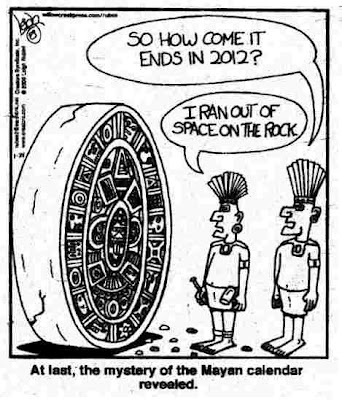Here goes... The movie 2012 is in theaters and has the population in an uproar. This entry will contain NO spoilers because I refuse to see this movie (until it comes out on DVD and I can get it at a redbox for $1).
In his sermon this morning, our pastor was discussing the "Love/Hate" relationship people have with the end of the world. No one wants it to come, people want to hide from it or try to stop it. But, nonetheless, people love to fantasize what will happen. They even make major motion pictures about it. (i.e. 2012, I Am Legend, Knowing, and the list goes on...). Why?? No idea!
However, what I can tell you is that people are freaking out way too much about 2012. I am sorry, Christianity never met the Mayans... two different continents at two very different times. People are mixing up the Christian Scriptures with a Mayan rock! (See cartoon)
 Christians, if you read the scriptures literally (which I usually do when the meaning is obvious) Matthew 24: 29-31 and 36-39 says:
Christians, if you read the scriptures literally (which I usually do when the meaning is obvious) Matthew 24: 29-31 and 36-39 says:29 ‘Immediately after the suffering of those days the sun will be darkened, and the moon will not give its light; the stars will fall from heaven, and the powers of heaven will be shaken. 30Then the sign of the Son of Man will appear in heaven, and then all the tribes of the earth will mourn, and they will see “the Son of Man coming on the clouds of heaven” with power and great glory. 31And he will send out his angels with a loud trumpet call, and they will gather his elect from the four winds, from one end of heaven to the other.
36 ‘But about that day and hour no one knows, neither the angels of heaven, nor the Son,* but only the Father. 37For as the days of Noah were, so will be the coming of the Son of Man. 38For as in those days before the flood they were eating and drinking, marrying and giving in marriage, until the day Noah entered the ark, 39and they knew nothing until the flood came and swept them all away, so too will be the coming of the Son of Man.
So obviously if you follow the scriptures then December 21st, 2012 is not be the coming of the end, because no one will know the time! Obviousness here.
Also a brief history lesson for those who do not know much about the Mayan Calender, the calender does not "end" but actually shifts into it's final stage. Each of these rings, moves inward at a certain point in time. The last ring ends on APPROXIMATELY December 21, 2012 (this is due to dating differences that we can only estimate) and shifts us into the final stage of the calendar. Nothing of significance happened at the times when the stages shifted in previous history (that we know of) so we can assume that the shift will not be entirely evident.
For those of you who remember, a similar pop-culture issue around the year 1999 left much of the world in panic. Y2K was coming! The shift into a new millennium (not really... the shift did not actually happen until 2001 because there is no year Zero). But still people were freaking out that computers would crash and the world would be ending. Popular books like the Left Behind series helped people to freak out even more. And what happened on January 1st, 2000. Nothing! Some computers went back to the year 1900, but the problem was fixed almost immediately. Man did a lot of people look like idiots!?

So for anyone who is freaking out about this. Consult historical data... nothing is going to happen. But I did hear there is going to be one hell of a party at the Mayan pyramid! (If you want to go I will try not to laugh... but I will probably fail).


